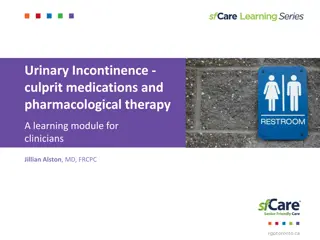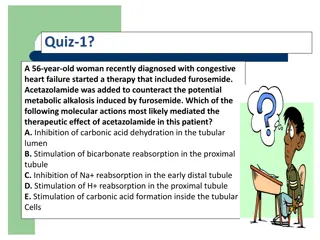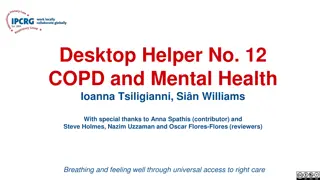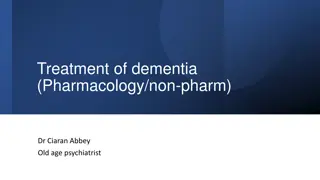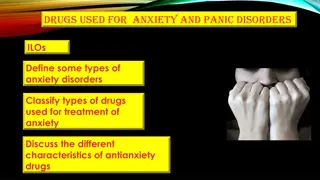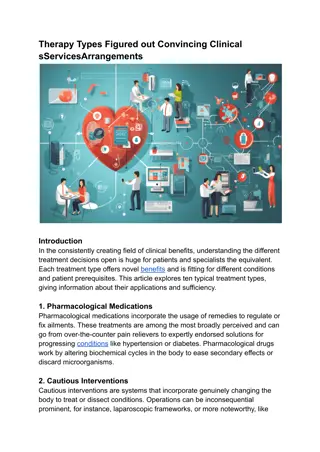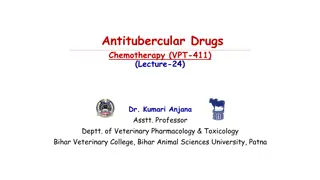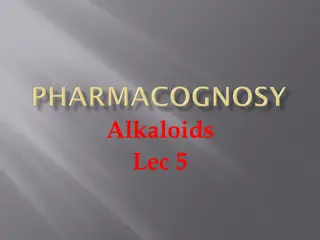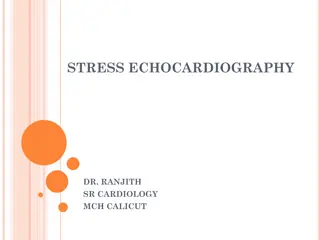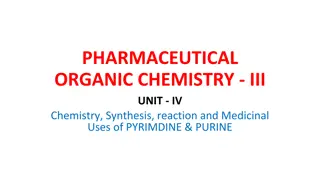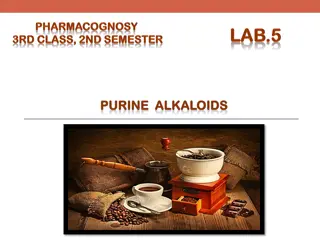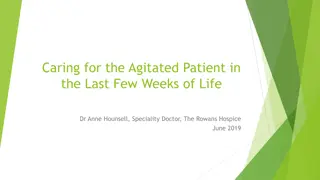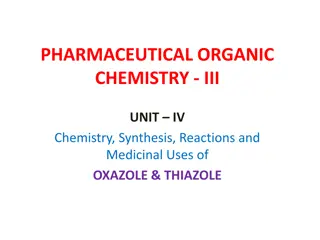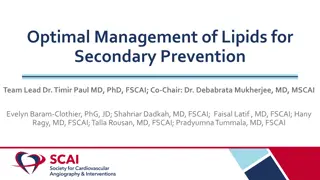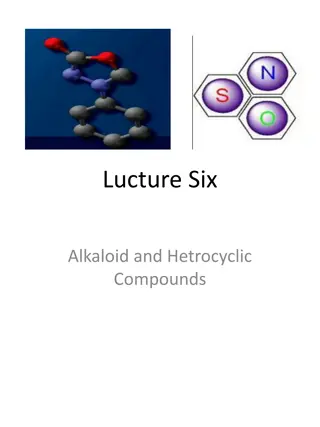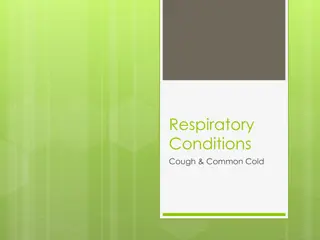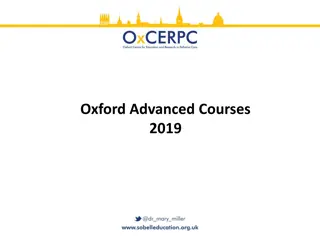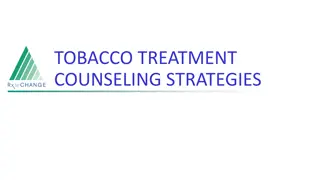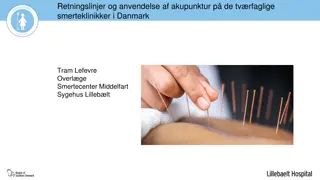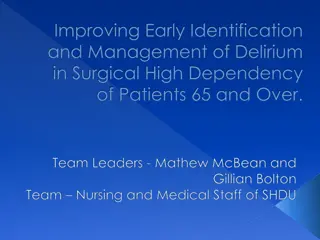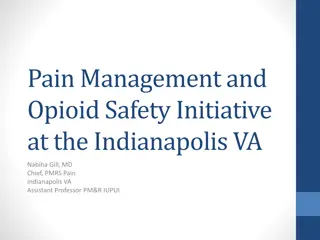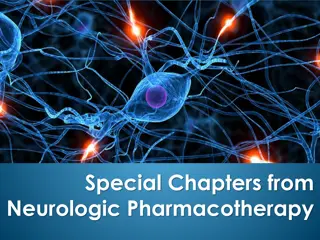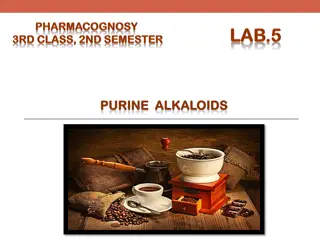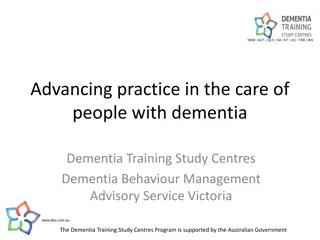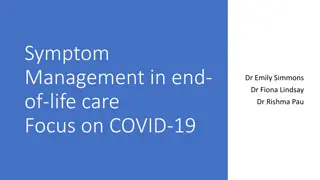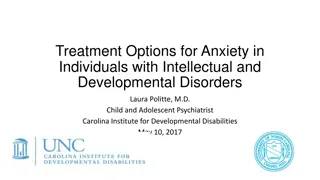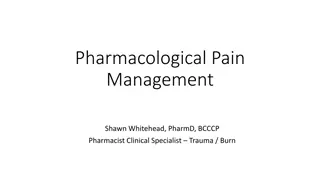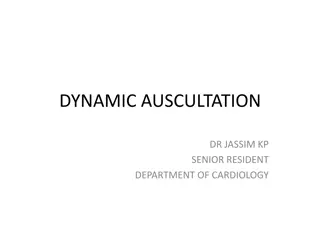Appropriate use of antipsychotics for changed behaviours in people living with dementia
Dementia is characterized by various changes, including behaviours such as wandering, disinhibition, agitation, and aggression. People living with dementia require care that can be approached through non-pharmacological and pharmacological strategies. The overreliance on psychotropic medications lik
1 views • 25 slides
Indirect-Acting Cholinergic Drug
Explore the classification, mechanism of action, and pharmacological effects of indirect-acting cholinergic drugs such as anticholinesterases. Learn about the importance, main uses, adverse effects, and contraindications of these drugs. Discover how anticholinesterases increase acetylcholine concent
1 views • 16 slides
Medications and Pharmacological Therapy for Urinary Incontinence
This learning module for clinicians discusses the physiology of bladder control, age-related changes in the genitourinary system, medications that contribute to urinary incontinence, pharmacological treatments for UI, side effects of medications used for UI, and a senior-friendly approach to optimiz
0 views • 30 slides
Pharmacology Quizzes on Diuretics and Their Clinical Applications
This content presents a series of quizzes involving diuretics and their role in clinical scenarios related to heart failure, glaucoma, renal hemodynamics, and intracranial pressure. Questions cover various diuretic agents such as furosemide, acetazolamide, mannitol, and hydrochlorothiazide, focusing
0 views • 10 slides
Managing Mental Health in COPD Patients: Practical Insights and Interventions
Mental health issues are prevalent among COPD patients, affecting about 30% to 80% with comorbid depression and anxiety. This article aims to raise awareness among primary care professionals about identifying and managing mental health problems in COPD patients. Strategies include non-pharmacologica
1 views • 11 slides
Comprehensive Overview of Dementia Treatment Strategies
Dementia, a syndrome resulting from various diseases affecting nerve cells and brain function, leads to cognitive decline. Treatment approaches include pharmacological and non-pharmacological interventions such as biomarker monitoring, lifestyle modifications, and addressing risk factors like hypert
0 views • 12 slides
Overview of Anxiety Disorders and Antianxiety Drugs
Anxiety disorders are conditions characterized by excessive worry and fear that can interfere with daily life. Common types include generalized anxiety disorder, panic disorder, phobias, and OCD. Treatment options include psychotherapy and anxiolytic drugs such as benzodiazepines, 5HT1A agonists, be
0 views • 25 slides
Therapy Types Figured out Convincing Clinical services Arrangements
Understanding the variety of accessible medical care therapies is fundamental for coming to informed conclusions about your well-being. This article dives into ten normal therapy types, including pharmacological therapies, careful mediation, exercise
0 views • 4 slides
Priorities and Quality Measures for Type 2 Diabetes Care in NHS GGC
Dr. Kashif Ali leads primary care for Type 2 diabetes, while Dr. James Boyle oversees secondary care in NHS GGC. The data from December 2018 shows the number of Type 2 diabetes patients, their care processes, HbA1c levels, and BMI status. The Diabetes Quality Improvement and Outcome Measures aim to
0 views • 27 slides
Pharmacological Management of Alzheimer's Disease and Cognitive Enhancers
Cognitive enhancers play a crucial role in managing Alzheimer's Disease, with Cholinesterase inhibitors (AChEI) like Donepezil, Galantamine, and Rivastigmine recommended for mild to moderate AD, and Memantine for moderate to severe cases. These medications act through different mechanisms, with AChE
0 views • 46 slides
Overview of Antitubercular Drugs: Introduction, Classification, and Applications
Tuberculosis is a chronic granulomatous disease caused by Mycobacterium bovis in ruminants and Mycobacterium avium in dogs and pigs. These bacteria have a unique waxy appearance due to their cell wall composition, providing a shield against pharmacological compounds. Antitubercular drugs play a cruc
3 views • 28 slides
Overview of Alkaloids in Pharmacology
Alkaloids are natural compounds found in various plants with diverse pharmacological properties. This lecture delves into alkaloids derived from sources like cinchona bark, discussing their structures, properties, and medical applications. It explores alkaloids such as quinine, quinidine, and ipecac
0 views • 17 slides
Comprehensive Guide to Stress Echocardiography in Cardiology Practice
Stress echocardiography is a valuable tool in diagnosing and managing coronary artery disease, valvular heart disease, and assessing heart function. This imaging technique helps in detecting flow-limiting stenosis, understanding the ischemic cascade, and evaluating cardiac function during stress. Va
1 views • 49 slides
Chemistry, Synthesis, Reactions, and Medicinal Uses of Pyrimidine & Purine
Explore the fascinating world of pharmaceutical organic chemistry in Unit IV, focusing on the chemistry, synthesis, reactions, and medicinal applications of Pyrimidine and Purine compounds. Dive deep into the structures, properties, and pharmacological significance of these essential molecules throu
2 views • 15 slides
Purine Alkaloids and Their Pharmacological Activities
Purine alkaloids are a class of compounds with a unique structure, different from typical alkaloids. They include caffeine, theophylline, and theobromine, each with distinct effects on the body. These compounds are found in plants like coffee, tea, and cola, and have various pharmacological activiti
4 views • 15 slides
Managing Agitation in Patients in End-of-Life Care
Understanding and managing agitation in patients during the final weeks of life is crucial for providing comfort and support. This presentation by Dr. Anne Hounsell covers key aspects such as defining agitation, identifying causes, assessing reversible factors, and implementing non-pharmacological i
0 views • 17 slides
Chemistry, Synthesis, Reactions, and Medicinal Uses of Oxazole & Thiazole
Explore the world of pharmaceutical organic chemistry in Unit IV, delving into the chemistry, synthesis, reactions, and medicinal applications of Oxazole and Thiazole. Gain insights into the structures, synthesis methods, and pharmacological significance of these important compounds through detailed
0 views • 18 slides
Optimal Management of Lipids for Secondary Prevention Team Study
Lipid management in secondary prevention plays a crucial role in reducing cardiovascular risk. This study led by Dr. Timir Paul aims to address system-level gaps in care, enhance communication for optimal therapy, and empower patients in achieving target lipid levels. By recognizing disparities and
0 views • 28 slides
Smoking: Risks, Cessation, and Public Health Concerns in Saudi Arabia
This presentation on smoking in Saudi Arabia covers the epidemiology, risks, and effects of smoking, including passive smoking. It also discusses strategies for smoking cessation, the role of healthcare professionals, and updates on pharmacological management. A case scenario of a smoker seeking hel
25 views • 53 slides
Alkaloids and Heterocyclic Compounds: A Comprehensive Overview
Alkaloids are natural compounds containing nitrogen, with various pharmacological activities. Heterocyclic compounds, essential to life, include a diverse range of compounds such as alkaloids, antibiotics, and vitamins. The lecture delves into the properties, classifications, and examples of these c
12 views • 7 slides
Interactive Medical Review: Bazinga! Semester Fun
Dive into a dynamic medical review session with Bazinga! Semester Review BurKava that includes engaging visual aids and challenging questions on topics like hypertension, circulation, and valve/DVT criteria. Learn the rules, measurements for aortic aneurysms, and pharmacological interventions, all d
0 views • 54 slides
Cough and Common Cold
Cough is a reflex action to clear airways, often caused by viral infections. It can be productive or non-productive, acute, sub-acute, or chronic. Assessing cough duration, nature, associated symptoms, drug-induced or condition-induced factors is crucial. Non-pharmacological treatments include steam
1 views • 31 slides
Cutting-Edge Insights on Pain Management and Rehabilitation Strategies
Gain valuable knowledge on topics ranging from neuropathic pain and neuroinflammation to rehabilitation models and advanced pain management medications like Gabapentin. Discover insights on pain phenotypes, trauma pathways, and the importance of personalized goal setting in rehabilitation. Stay upda
0 views • 14 slides
End-of-Life Symptom Management for COVID-19 Patients: A Comprehensive Guide
This comprehensive guide focuses on symptom management in end-of-life care for COVID-19 patients, covering identification of signs of dying, communication with residents and families, recognition of end-of-life symptoms, and pharmacological/non-pharmacological approaches. It also provides valuable r
0 views • 19 slides
Tobacco Treatment Counseling: Strategies and Guidelines for Clinicians
Effective tobacco treatment counseling strategies, including addressing physiological and behavioral aspects of dependence, offering pharmacological treatments, and utilizing various clinician types, can significantly increase the likelihood of successful smoking cessation. Clinician interventions p
0 views • 44 slides
Guidelines and Applications of Acupuncture in Multidisciplinary Pain Clinics
The document discusses guidelines and utilization of acupuncture in multidisciplinary pain clinics in Denmark, covering topics such as patient demographics, organization, responsibilities, and recent research trends. It highlights the increasing interest in clinical studies on acupuncture and presen
0 views • 9 slides
Enhancing Delirium Management in Surgical High Dependency Patients 65 and Over
Improving early identification and management of delirium in surgical high dependency unit (SHDU) patients aged 65 and over led by Mathew McBean and Gillian Bolton. Data collection, education initiatives, and pharmacological management guidelines were implemented, resulting in increased staff confid
0 views • 5 slides
Pain Management and Opioid Safety Initiative at Indianapolis VA
This initiative led by Dr. Nabiha Gill focuses on educating healthcare professionals about the Final Indiana pain management rules, opioid safety measures, and non-pharmacological pain management options. The program aims to address chronic pain in veterans, a prevalent issue impacting service membe
0 views • 41 slides
Pharmacotherapy Overview of Parkinson's Disease and Related Disorders
Overview of pharmacological treatment options for Parkinson's disease and related conditions like choreatic dyskinesias, spastic disorders, and myasthenia gravis. Describes the degenerative process of Parkinson's disease, its symptoms, and the pharmacological interventions targeting dopamine deficit
0 views • 26 slides
Purine Alkaloids: Properties, Isolation, and Pharmacological Activities
Purine alkaloids are a group of compounds with unique characteristics, such as a heterocyclic nucleus and specific methylated forms like caffeine, theophylline, and theobromine. While they have diverse pharmacological activities like CNS stimulation and diuretic effects, their identification often i
0 views • 16 slides
Pain Relief Options in Labor
Provision of analgesia during childbirth varies among cultures, with some women preferring non-pharmacological methods like relaxation, breathing exercises, and warm water immersion, while others opt for pharmacological options such as opiates. Professionals play a crucial role in advising women on
0 views • 23 slides
Advancing Dementia Care: Treatment Options and Management Strategies
This content delves into the strategies for advancing the care of individuals with dementia, focusing on treatment and management options. It discusses the role of pharmaceuticals, legal considerations, safety measures, and the importance of avoiding physical restraints in dementia care. Non-pharmac
0 views • 13 slides
Symptom Management in End-of-Life Care: Focus on COVID-19
Review signs of dying, communicate effectively with residents and families, identify end-of-life symptoms (especially related to COVID-19), and explore non-pharmacological and pharmacological approaches for symptom management. Resources and guidance are provided for caring for individuals in the com
0 views • 19 slides
Treatment Options for Anxiety in Individuals with Intellectual and Developmental Disorders
Explore unique presentations of anxiety in individuals with intellectual and developmental disorders, evaluate evidence-based interventions - both pharmacological and non-pharmacological, review practical strategies for managing anxiety symptoms, and identify barriers to treatment and future researc
0 views • 38 slides
Comprehensive Overview of Pharmacological Pain Management Strategies
This comprehensive overview covers various aspects of pharmacological pain management, including behavioral measures for patients unable to self-report pain, building pain regimens, NSAIDs use and associated risks, NSAIDs and COX selectivity, clinical presentation of pain symptoms, gabapentinoids fo
0 views • 22 slides
DYNAMIC AUSCULTATION
Dynamic auscultation involves techniques to alter circulatory dynamics through physiological and pharmacological maneuvers, impacting heart sounds and murmurs. This process includes assessing the effects of maneuvers like respiration, postural changes, isometric hand grip, and pharmacological agents
0 views • 61 slides
ANS Pharmacology: General ANS Pharmacology: General
The autonomic nervous system (ANS) plays a crucial role in controlling visceral functions below the level of consciousness. It regulates activities of secretory glands, smooth muscles, and visceral organs without voluntary control. The ANS is divided into sympathetic and parasympathetic divisions, e
0 views • 23 slides
Pharmacological Therapy for Type 2 Diabetes
Pharmacological therapy plays a crucial role in managing Type 2 Diabetes Mellitus (T2DM), focusing on treatment goals, principles, and case studies. It discusses treatment guidelines, goals, and different pharmacological options to control hyperglycemia effectively.
0 views • 39 slides
Basic management of Orthostatic Hypotension
Review definition, initial evaluation steps, neurogenic OH features, medication contributors, non-pharmacological & pharmacological treatments, with emphasis on careful history, vital monitoring, and specialized testing when necessary. Includes references.
0 views • 5 slides
STEROIDS IN NEUROSURGERY
Steroids have played a crucial role in the field of neurosurgery since their discovery in the mid-19th century. From the history of adrenal glands to the synthesis of different hormones, steroids have been instrumental in various medical conditions, including neurosurgical interventions. Understandi
0 views • 79 slides


